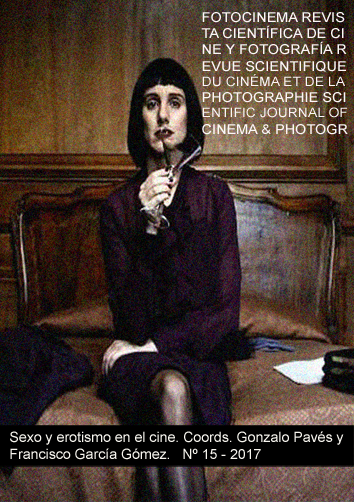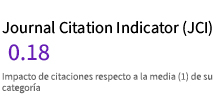El sexo como narración. La conexión entre 9 song y Plantaforma
DOI:
https://doi.org/10.24310/Fotocinema.2017.v0i15.3503Keywords:
cine, literatura, adaptación, sexo, amor líquido, Cinema, Literature, Adaptation, Sex, Liquid LoveAbstract
El objetivo de este artículo constiste en analizar la novela Plataforma de Michel Houellebecq comparándola con la libre adaptación que Michael Winterbottom realizó en la película 9 songs. Examinando las convergencias y divergencias de estos dos textos, enmarcaremos este análisis en su contexto sociocultural para investigar cómo reflejan la problemática de las relaciones humanas, y más concretamente el sexo, en el cambio de milenio de una sociedad globalizada, en el eterno debate de la cultura contra la naturaleza; si son dos obras que tratan sobre la misma tesis, o si finalmente llegan a diferentes conclusiones. Para ello incidiremos en cómo se pone en escena audiovisualmente la propuesta de Houellebecq, y los cambios significativos que ello aporta a la experiencia del espectador. La hipótesis a demostrar es que, pese a esos posibles cambios, hay una idea común que se basa en entender el sexo, en pleno siglo XXI, como una mercancía o valor de cambio asumido de forma natural en una economía globalizada, basándonos en las teorías de Bauman.
Abstract:
The aim of this article is to analyse Michael Winterbottom’s film adaptation, 9 songs, from Michel Houellebecq’s novel Platform, comparing differences and similarities of both works. Framed within a social-cultural context, this article is going to look into the controversy of human relationships, and more specifically sex, in the change of millenium of a society marked by globalization. Having a look at the eternal debate of culture against nature, this work will also analyse whether these works are about the same thesis. Finally, we will focus on Winterbottom’s way of turning Houellebecq’s novel into a film. The hypothesis to confirm is that of, despite those changes, there is a common understanding of the idea of sex as a trade in the current economic paradigm, based on Bauman’s theories.
Downloads
Metrics
Publication Facts
Reviewer profiles N/A
Author statements
Indexed in
-
—
- Academic society
- N/A
- Publisher
- Universidad de Málaga
References
Bauman, Z. (2015). Vida líquida. Barcelona: Paidós.
Bauman, Z. (2016). La cultura como praxis. Barcelona: Paidós.
Bennett, B. (2014). The cinema of Michael Winterbottom. Borders, Intimacy, Terror. Columbia: Wallflower Press.
Gubern, R. (2005). La imagen pornográfica y otras perversiones ópticas. Barcelona: Anagrama.
Heidegger, M. (2015). Cuadernos negros. 1931-1938. Madrid: Trotta.
Houellebecq, M. (2015). Plataforma. Barcelona: Anagrama.
http://www.bbc.co.uk/films/2005/03/03/michael_winterbottom_9_songs_interview.shtml, 03 March 2005, “Michael Winterbottom 9 Songs Interview” (consultado el 2 de mayo de 2017).
http://www.independent.co.uk/arts-entertainment/films/features/lights-camera-explicit-action-563135.html, 12 May 2004, “Lights, Camera, Explicit Action (consultado el 8 de mayo de 2017).
http://www.nytimes.com/2005/07/03/magazine/michael-winterbottom-gets-naked.html?_r=2, 03 July 2005, “Michael Winterbottom Gets Naked” (consultado el 26 de abril de 2017).
http://cultura.elpais.com/cultura/2004/09/19/actualidad/1095544801_850215.html, 19 septiembre 2004, “La crítica, dividida entre «9 songs» de Winterbottom y «Roma» de Aristarain” (consultado el 20 de abril de 2017).
Downloads
Published
How to Cite
Issue
Section
License
All contents published in Fotocinema Revista científica de cine y fotografía are protected under the Creative Commons Attribution-NonCommercial-ShareAlike 4.0 International (CC BY-NC-SA 4.0) license. All about this license is available in the following link: <http://creativecommons.org/licenses/by-nc-sa/4.0>
Users can copy, use, redistribute, share and exhibit publicly as long as:
- The original source and authorship of the material are cited (Journal, Publisher and URL of the work).
- It is not used for comercial purposes.
- The existence of the license and its especifications are mentioned.
There are two sets of authors’ rights: moral and property rights. Moral rights are perpetual prerogatives, unrenounceable, not-transferable, unalienable, imprescriptible and inembargable. According to authors’ rights legislation, Fotocinema. Revista científica de cine y fotografía recognizes and respects authors moral rights, as well as the ownership of property rights, which will be transferred to University of Malaga in open access. The property rights are referred to the benefits that are gained by the use or the dissemination of works. Fotocinema. Revista científica de cine y fotografía is published in an open access form and it is exclusively licenced by any means for doing or authorising distribution, dissemination, reproduction, , adaptation, translation or arrangement of works.
Authors are responsable for obtaining the necessary permission to use copyrighted images.














13.png)



